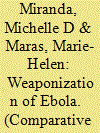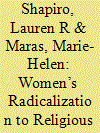|
|
|
Sort Order |
|
|
|
Items / Page
|
|
|
|
|
|
|
| Srl | Item |
| 1 |
ID:
156928


|
|
|
|
|
| Summary/Abstract |
Existing organizational cultures among agencies in the intelligence community serve as barriers to information sharing. These cultures are characterized by secrecy and limited disclosure of information. Their practices of limited information distribution and existing extensive compartmentalization of information serve as impediments to information exchange between agencies in the intelligence community. To remedy this, changes in the organizational cultures of agencies in the intelligence community are required. Without a change in organizational culture, the culture of information sharing envisioned by the reforms that have occurred in the intelligence community post-9/11 will not be realized.
|
|
|
|
|
|
|
|
|
|
|
|
|
|
|
|
| 2 |
ID:
150087


|
|
|
|
|
| Summary/Abstract |
In 2014, the world saw an unprecedented outbreak of Ebola that spanned several countries, including the United States. Considered a highly contagious, extremely virulent bioterrorism agent, the introduction of Ebola within U.S. borders uncovered myriad deficiencies in emergency response and preparedness, international travel policies and restrictions, and how the U.S. healthcare system handles such viral agents in infected individuals. This article explores the potential for the weaponization of Ebola, looking in particular at its plausibility for use in a bioterrorism attack. After describing the epidemiology of Ebola and its classification as a bioterrorism agent, this article examines the risk of the weaponization of Ebola and delineates the weaknesses identified in the ability of the United States to handle Ebola cases during the 2014 outbreak, which could be exploited by terrorists to effectively execute a bioterrorism attack.
|
|
|
|
|
|
|
|
|
|
|
|
|
|
|
|
| 3 |
ID:
164598


|
|
|
|
|
| Summary/Abstract |
American women joining Islamic State of Iraq and Syria (ISIS) have increased and their roles evolved beyond auxiliary and domestic provisions, demonstrating both agency and tenacity for pursuing, recruiting, supporting, and spreading extreme Islamist ideals and terrorism. Social learning theory was applied to information gained from open-source court cases as a way of examining how thirty-one U.S. women acquired, maintained, and acted pursuant to radicalization to religious terrorism for ISIS. Internet functionalities, reasons, roles, and support types for radicalization and illegal activities for ISIS were examined using self-, dyad-, and group-classifications. A gendered interventive program based on social learning theory’s extinguishing of radicalized ideology and behavior was outlined.
|
|
|
|
|
|
|
|
|
|
|
|
|
|
|
|
|
|
|
|
|